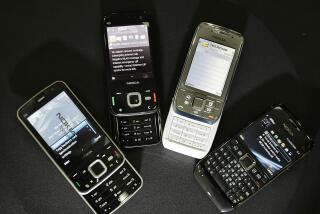Changing Public Into Private
- Share via
So there I am in the midst of a migrainous lecture on Hegel’s theory of the history of fine art, and someone’s cell phone goes off.
The whole class pauses as the embarrassed student fetches her phone from her backpack to turn the thing off, while I attempt to collect my thoughts. Then, just as I’m ready to plunge back in to the Hegelian quagmire, someone asks, “Professor Solomon, could you repeat everything that you just said?”
And so I enter another anecdote into the Cell Phone Files.
Cell phone annoyances: Who doesn’t have a story to tell, from the guy who glissades across three lanes of the freeway cell phone in hand, to the woman in the restaurant whose telephone conversation can be heard clear to the cashier? Heck, even all those ads telling not to use our cell phones while driving are annoying.
But what does it all mean?
As with most popular cultural phenomena, the cell phone explosion is complicated, with many possible explanations. To understand, it helps to look back to the dawning of the era. In those days, cell phones were rare, expensive and hard-wired into automobiles (which is why a lot of us still call them car phones). Since VIPs used them in their limousines, cell phones quickly became status symbols--a significance that lingers today.
But the current ubiquity, and low cost, of the cell phone has much reduced its value as a status symbol. Although there is still a tendency to associate them with the much-despised yuppies of the 1980s, so many people of all ages and classes use them these days that the association doesn’t mean very much anymore.
After all, I have a cell phone myself, and for the same reason that a lot of people have them: for safety. Indeed, traffic safety instructors advise you to carry a cell phone for highway emergencies, insisting that if your car breaks down you should roll up the windows, lock the door and phone for help.
The significance is obvious: In an increasingly anarchic public realm, the need for a cell phone as a form of personal protection is a sign of a fragmented and even dysfunctional society.
The frequency with which parents hand out cell phones to their children is a related phenomenon. For while the bills mounted up by conversation-loving teens can rival a monthly mortgage, nervous parents feel safer knowing that they can get in touch with their kids at any time.
*
But what about all those adults one sees flipping out their phones the minute they leave a building? Their cars haven’t broken down. They aren’t in danger. They aren’t all conducting urgent business. And most of them aren’t trying to impress anyone. So what else might be going on?
Certainly part of the explanation is that people’s lives are very complicated these days. Juggling several tight schedules--their own, their employers’, their children’s and their spouses’--they find in the cell phone a useful tool to help keep things together. Hence, the cell phone is partly an indicator of the increased complexity of everyday life.
But I think that there is still more to the matter. You would think, for example, that at least while watching a movie or a play people would turn their phones off. But theaters are one of the places where cell phones make some of their most annoying appearances. “To be or not to be,” Hamlet soliloquizes, but the guy in the next seat is talking to his tax accountant.
The key to the matter is that when people use their cell phones in public spaces, they are, in effect, transforming public into private space. Once we conducted our private business at home; now, thanks to the cell phone, private business is often conducted in public. The traditional barrier between public and private space seems, somehow, to be breaking down.
To put this another way, for many people public space as such no longer exists. All the world, whether a theater, a restaurant or the open road, has become their private playground. Turning their backs on the public world around them to retreat into their hand-held cocoons, such phone users reflect a larger social phenomenon in which fewer and fewer people identify with what used to be called the “commonweal” and instead value only their own private spheres of friends and family.
*
In such a world it is little wonder why the rest of us carry cell phones for protection, because when a society loses its sense of a public identity, it atomizes into alienated individuals who neither trust each other nor have much reason to do so.
In the end it’s safer to stay at home, but if I have to go out (as we all do), is it so much to ask of the woman in the Ford Explorer who cut me off as she veered in front of me on the way to work this morning to please hang up the phone?


